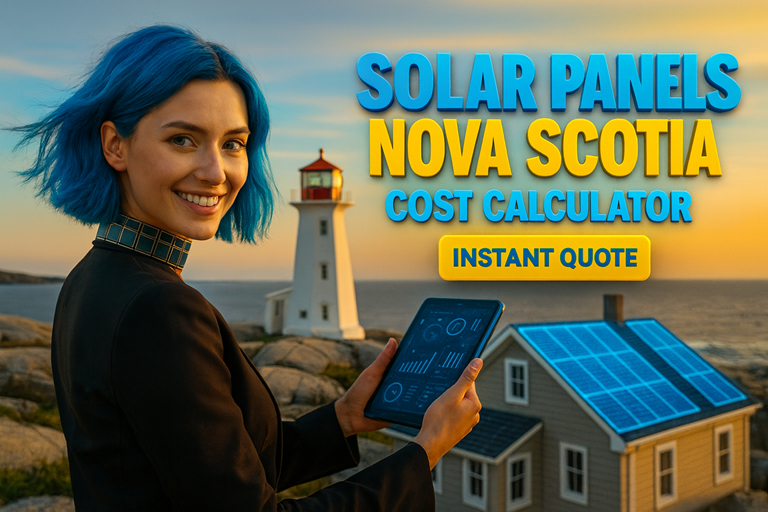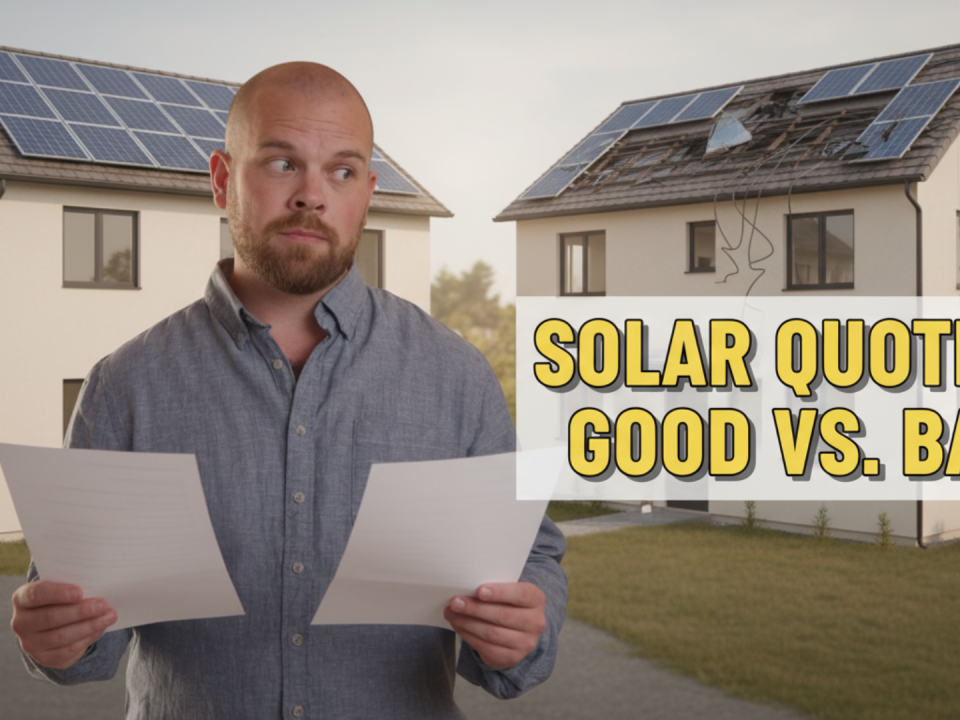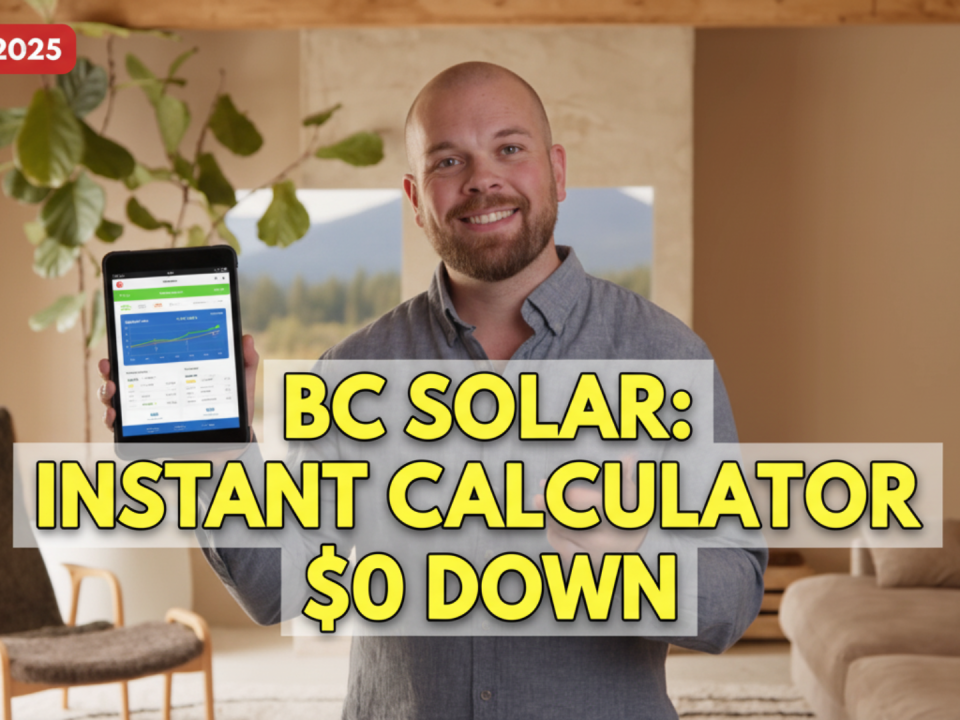
Alberta Jails Go Solar: The Shocking Plan to Save Taxpayers Millions
August 21, 2025
Solar Panels In The Arctic: Solar Power Potential In Canada?
August 26, 2025Let’s get straight to it. You’re wondering what it costs to get solar panels on your roof in Nova Scotia. The short answer is that a typical residential solar installation will likely land somewhere between $20,000 and $35,000 before any financing or incentives are applied. A smaller 5 kW starter system might come in under $19,000, while a larger 12 kW system could be over $40,000.
These numbers can feel big, and that’s okay. My goal here isn’t to sell you a system; it’s to break down exactly where that money goes, how you can lower the cost, and what the real return on your investment looks like. After 12 years in this field, I’veseen that the upfront cost is the biggest hurdle for most people.
The main purpose of this page is to give you clarity. We’ll walk through all the factors that influence the final price tag. That’s why this page has a calculator. Plug in your address and average power bill to get an instant, personalized quote. Use it now, or read on as I break down every part of that cost for you.
What is the Average Cost of Solar Panel Installation in Nova Scotia?
To understand the total cost, we first need to look at the key factors that build the final price. It’s more than just the panels themselves.
How does Nova Scotia’s location affect solar panel cost?
Nova Scotia gets a good amount of sun—enough to make solar a smart financial move. Your specific location in the province determines how much energy a panel can produce. For example, a solar panel in Amherst will generate slightly more electricity over a year than the same panel in Halifax due to differences in solar irradiance. This doesn’t change the cost of the equipment, but it does change the value and how quickly the system pays for itself. An installer will use your location’s specific solar data to calculate the right system size for your home, which directly impacts the total cost.

What are the typical installation costs for residential solar panels in Nova Scotia?
The final price you pay covers several things:
- Hardware: This is the biggest chunk, usually 50-60% of the total. It includes the solar panels, the inverter (which converts solar energy into usable electricity for your home), and the racking equipment that mounts everything to your roof.
- Labor & Permits: This covers the cost of the installation crew, electricians, and securing the necessary permits from your municipality. This can be 25-30% of the budget.
- Design & Engineering: Before anyone gets on your roof, a team designs the system to maximize production and ensure it meets all safety codes.
Here’s a rough breakdown for a standard 6 kW system, which costs about $22,600:
| Component | Percentage of Budget | Typical Cost |
|---|---|---|
| Solar Panels | 37% | $8,300 |
| Inverter & Racking | 23% | $5,200 |
| Labour & Permits | 28% | $6,300 |
| Design & Company Margin | 12% | $2,800 |
What is the average solar panel system cost per watt in Nova Scotia?
In the solar industry, we often talk about cost in terms of dollars per watt. This helps compare quotes from different companies on an apples-to-apples basis. In Nova Scotia, the average cost is between $2.60 and $3.27 per watt.
So, for a 10 kW (10,000-watt) system, you can expect a gross cost of $26,000 to $32,700 before any incentives.

How Does a Solar Calculator Help Determine Solar Panels Cost in Nova Scotia?
A solar calculator is your starting point. It takes general data and gives you a personalized estimate without you having to talk to a sales rep first.
How accurate are online solar calculators for estimating solar panel costs in Nova Scotia?
Our calculator is designed to be quite accurate. It uses up-to-date information on local electricity prices, installation costs, and available incentives. It gives you a solid ballpark figure to work with. A final quote from a solar installer will be more precise because they will do a detailed assessment of your roof, shading, and electrical setup. Think of the calculator as a powerful first step.
What information do I need to use a solar calculator to get an instant quote for solar in Nova Scotia?
To get the most accurate quote from our calculator, you’ll want to have a couple of things handy:
- Your Average Monthly Power Bill: Look at your last few bills from Nova Scotia Power and find your average monthly cost.
- Your Home Address: This allows the calculator to use local solar irradiance data and identify any municipal-specific programs available to you.
That’s it. With that information, the tool can estimate your annual energy consumption and recommend a system size tailored to your needs.

What Solar Incentives and Rebates are Available in Nova Scotia to Reduce Solar Panels Cost?
This is where the upfront cost starts to look much more manageable. Nova Scotia has had some great programs to help homeowners go solar.
What solar programs does the province of Nova Scotia offer to go solar and reduce the total cost?
The main provincial program was the SolarHomes Program, which offered a rebate of $0.30 per watt. Unfortunately, this program ended for new applicants in January 2024. While it’s no longer available, its success helped thousands of Nova Scotians install solar.
Are there any federal solar incentives like the Greener Homes Grant that Nova Scotians can use to install solar panels?
Important Disclaimer: The Canada Greener Homes Grant, which offered up to $5,000, closed to all new applicants on February 5, 2024. If you did not have an application in before this date, you cannot apply for the grant.
However, the Canada Greener Homes Loan is still very much active. This federal program allows you to get an interest-free loan of up to $40,000 with a 10-year repayment term. This is a game-changer for financing a solar installation, as it effectively removes the interest cost from the equation. I just walked a family in Halifax through this. They financed their entire system with the Greener Homes Loan, so their monthly payment is now almost identical to their old power bill. The key difference is that in 10 years, their loan is paid off, but the panels will keep working for another 15-20 years. That’s when the real, free-and-clear savings kick in.
How does net metering with Nova Scotia Power help offset solar panels cost and lower my power bill?
Net metering is the system that makes solar financially viable. Here’s how it works:
- When your solar panels produce more electricity than your home is using, the excess power is sent to the grid.
- Nova Scotia Power gives you a credit for every kilowatt-hour (kWh) you send them.
- These credits are “banked” and automatically used to offset the cost of any electricity you pull from the grid at night or on cloudy days.
Essentially, you are using the grid as a giant battery. You get credited at the full retail rate for your excess energy. Right now, that rate is about $0.18 per kWh. Getting that full value is what helps you drive your power bill down to zero.
How Does System Size Affect Solar Panel Costs in Nova Scotia?
The single biggest factor in the total cost of your solar project is the size of the system.
What system size do I need to reduce my power bill to zero, and what is the cost in Nova Scotia?
The average home in Nova Scotia uses about 10,000 kWh of electricity per year. In this province, 1 kW of solar panels will produce about 1,000 kWh of electricity annually.
So, to offset that usage, you would need a 10 kW solar system. Since electricity costs about $0.18 per kWh, that 10,000 kWh of energy is worth roughly $1,800 a year. That’s the direct saving you’d see. Using our average cost per watt ($2.60 – $3.27), a 10 kW system would have a gross cost between $26,000 and $32,700.
Tip for System Sizing: Don’t just look at last year’s bills. Think about the future. Are you planning to buy an electric vehicle or install a heat pump? Tell your solar installer about these plans. It’s much cheaper to install a slightly larger system now than to add more panels later.
How do I determine the appropriate solar panel system size for my home in Nova Scotia?
A reputable solar installation company will do this for you. They will analyze your past 12 months of energy usage and conduct a site assessment to see how much usable roof space you have. They’ll then present you with a few options to meet your energy goals and budget.
What are the Panel Types and How Do They Affect Solar Panels Cost in Nova Scotia?
Not all solar panels are created equal. The type you choose will affect both the cost and the performance of your system.

Are there significant cost differences between different panel types such as monocrystalline and polycrystalline solar panels in Nova Scotia?
Yes, there are. The two main types you’ll see are monocrystalline and polycrystalline.
- Monocrystalline Panels: These are made from a single, pure silicon crystal. They are more efficient (meaning they produce more power per square foot) and have a sleek, black appearance. They are also more expensive.
- Polycrystalline Panels: These are made from multiple silicon fragments melted together. They are slightly less efficient and have a blue, speckled look. Their main advantage is a lower cost.
| Panel Type | Average Cost per Watt | Efficiency | Appearance |
|---|---|---|---|
| Monocrystalline | $2.50 – $3.50 | Higher (18-23%) | Sleek, uniform black |
| Polycrystalline | $2.00 – $3.00 | Lower (15-18%) | Blue, speckled |
Is it worth paying more for higher-efficiency solar panels to reduce the system size and potential installation costs in Nova Scotia?
For most homeowners in Nova Scotia, the answer is yes. If you have limited roof space, high-efficiency monocrystalline panels are the best choice because you can generate more power from a smaller area. While the upfront cost is higher, the long-term energy production often provides a better return.
What is Community Solar and How Does it Affect Solar Panels Cost for Nova Scotians?
Community solar is an exciting option for people who can’t install panels on their own property.

Are there any community solar garden projects in Nova Scotia that allow me to access solar power without installing solar panels on my roof?
Yes. Nova Scotia has a Community Solar Program. This program allows organizations to build large “solar gardens.” A great example is the project in Amherst. Residents can subscribe to a portion of one of these gardens.
How does participating in community solar affect my power bill and overall energy system in Nova Scotia?
When you subscribe to a community solar project, you don’t own any panels. Instead, you pay a subscription fee and in return, you receive a credit on your regular power bill for the energy your share of the garden produces. The credit is currently set at $0.02/kWh. It’s a way to support renewable energy and get a modest discount on your electricity without the upfront cost of a full installation.
How Do I Find a Reputable Solar Installer in Nova Scotia and What are Typical Installation Costs?
Choosing the right installer is the most important decision you’ll make.
What are some questions about solar I should ask a solar installation company before getting a quote in Nova Scotia?
Here are the top questions you should ask any potential solar installer:
- How many years have you been in business in Nova Scotia?
- Are your installers your own employees or subcontractors?
- Are you and your electricians fully licensed and insured in Nova Scotia?
- Can you provide a clearance letter from the Workers’ Compensation Board (WCB) of Nova Scotia?
- What warranties do you offer on the equipment and your workmanship?
- Who handles the permits and the interconnection agreement with Nova Scotia Power?
How do I ensure the solar installer is licensed and insured to provide solar panel installation services in Nova Scotia?
Ask for proof. A professional company will have no problem providing you with copies of their licenses, insurance certificates, and WCB clearance letter. You can also check with organizations like Efficiency Nova Scotia for a list of registered solar installers.
What is the solar panel installation process and how long does it typically take to install solar panels on a home in Nova Scotia?
From the day you sign the contract to the day your system is turned on, the process usually takes a few weeks to a couple of months. The physical installation on your roof is surprisingly fast—often just 2-3 days. The rest of the time is for engineering, permits, and final inspection from Nova Scotia Power.
Making the switch to solar is a big decision, but it’s one that pays off for years to come. The key is to start with good information. I hope this breakdown has given you a clearer picture of the costs and process in Nova Scotia.
- Vitaliy Lano, SolarEnergies.ca Canada Goes Solar




